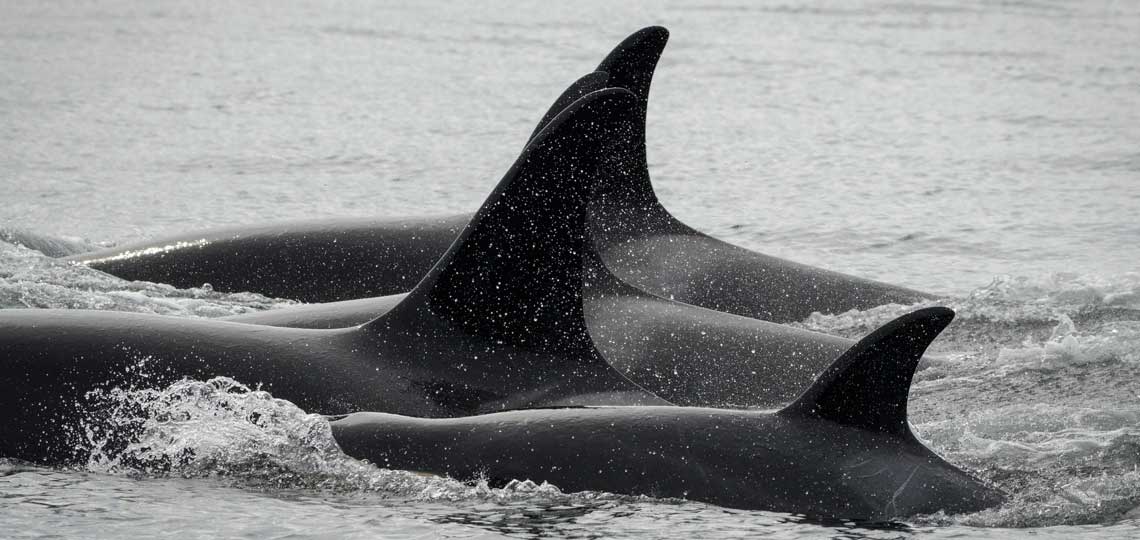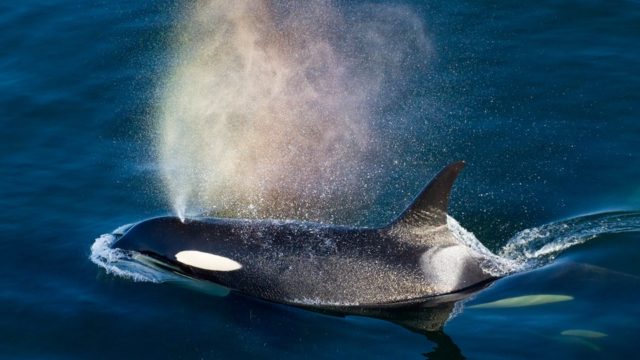Despite imminent threats to the Southern Resident killer whales and our calls for urgent action, the Minister of Environment and Climate Change and the Minister of Fisheries and Oceans have failed to recommend emergency protections for these endangered whales — leaving us little choice but to turn to the courts.
Last week’s Trans Mountain decision was many things. A resounding win for endangered Southern Resident killer whales. A victory for First Nations rights. An opportunity for Canada to embrace an accelerated transition away from fossil fuel dependency and toward a clean energy economy.
It was also a stark warning to the government: don’t expect to ignore the law and get away with it.
We fought the project — and won — on the argument that Cabinet should not have approved the expansion on the basis of a flawed National Energy board review that left out the impacts of marine shipping on Southern Resident killer whales.
The courts agreed unanimously with our argument, striking down the government’s approval of a project that, if completed, would increase tanker traffic through critical Southern Resident killer whale habitat seven-fold.
But Southern Residents aren’t just up against the threat of increased tanker traffic down the line. They also face imminent threats here and now: a lack of Chinook salmon, their preferred prey, physical and acoustic disturbance from vessels, which impedes their ability to hunt and communicate, and pollution.
A mother’s public and prolonged grieving for her dead calf and desperate attempts this summer to save J-50, an emaciated three-year-old, are evidence of how severe the situation is.
In the face of these tragic examples, the ministers have failed to recommend emergency protections.
But if last week’s victory against the Trans Mountain pipeline expansion tells us anything, it is that decision-makers can’t flout their responsibilities under the Species at Risk Act without consequence.
With only 75 whales remaining, more delays from the ministers could push the Southern Residents further towards extinction. That is why we are taking the ministers to court in a bid to force them to act now to protect the orca population.
On behalf of David Suzuki Foundation, Georgia Strait Alliance, Natural Resources Defense Council, Raincoast Conservation Foundation and World Wildlife Fund Canada, we filed a notice of application in the Federal Court this morning, asking it to compel the ministers to recommend that Cabinet issue an emergency order. The Ministers are legally-obligated to make this recommendation, having already acknowledged that the Southern Residents face “imminent threats” to their survival and recovery.
Southern Resident killer whales: distinct, significant, and under threat
Southern Resident killer whales make up a genetically and culturally-distinct population of salmon-eating whales that live in the Salish Sea, off the coast of British Columbia and Washington State.
These killer whales are significant both ecologically and culturally. They are bellwethers of the Salish Sea, providing clues to the wellbeing of the entire ecosystem. And they hold a revered role in local First Nations culture, and are an icon throughout the Pacific Northwest and beyond.
However, as the ministers have noted, Southern Residents face critical threats to their immediate and long term survival and recovery.
These circumstances have had a devastating effect: In recent years, 69 per cent of Southern Resident pregnancies have failed and the Department of Fisheries and Oceans has confirmed that the population is in decline. No surviving calves have been born since 2015 and there is evidence of nutritional stress in the population.
We can see the physical evidence of this in J-50, one of the only five surviving whales born during the “baby boom” of 2014 to 2016, when Southern Resident mothers gave birth to a total of 11 calves. J-50’s small size and weakened condition caused scientists to fear for her survival, and inspired a major effort to get food and medicine to her.
Orcas are also social, emotional animals, and the toll on the population is not only physical.
On Aug. 24, a 20-year-old orca named J-35 — also known as Tahlequah — gave birth to a calf. When it died just half an hour later, the mother carried the dead calf on her head or, gently, in her mouth, transporting the body for an unprecedented 17 days in what experts described as a display of grief.
Tahlequah’s prolonged mourning was a symbol of the deep trauma this population has endured, and a sign of the consequences that could come from further inaction.
In the last 25 years, the population of Southern Resident killer whales has declined by more than 20 per cent. Today, only 75 Southern Resident killer whales remain. Each loss makes it more difficult for the population to rebound, and more likely that the population will become extinct.
Together with our clients, we are committed to doing everything we can to prevent this from happening — including taking the ministers to court.
How did we get here?
Ecojustice has worked with conservation groups for more than a decade to protect resident killer whales off the coast of British Columbia. And through it all, supporters like you have been essential to this work.
Most recently, we have concentrated our efforts on demanding an emergency order to protect the Southern Residents. Here are some key dates:
- Jan. 30, 2018: We sent a petition to Minister McKenna and Minister LeBlanc urging them to recommend an order and giving them a March 1 deadline to respond.
- Jan. 31, 2018: We asked the Ecojustice community to put pressure on the ministers by sending their own letters calling for an emergency order. By Feb. 28, Ecojustice supporters had sent more than 10,000 letters to the ministers.
- Feb. 17, 2018:Together with our partners, we marked World Whale Day 2018 with a coordinated online push encouraging the ministers to recommend an emergency order. The following week, Dr. Lance Barrett-Lennard, the director of the Cetacean Research Program and Ocean Wise in Vancouver, published an opinion piece in The Hill Times, arguing that politicians need to act now to protect the Southern Residents.
- March 21, 2018: We met with officials from Ministry of Environment and Climate Change, Department of Fisheries and Oceans, and Transport Canada. Unfortunately, ministry representatives failed to commit to an emergency order or equivalent enforceable measures at that time. They also could not commit to a timeline for action to protect the Southern Residents.
- May 24: Amid growing calls for action, the ministers formally acknowledged that the Southern Residents face imminent threats to their survival and recovery, triggering the obligation to recommend an emergency order. In the following weeks, hundreds of Ecojustice supporters sent tweets to the ministers, urging them to make the recommendation.
- July 24-Aug. 11: Southern Resident Tahlequah (J35) gave birth to a calf that survived only half an hour, then carried her for 17 days in an unprecedented display of mourning. As Tahlequah entered her third week of grieving, I published an opinion piece in the Narwhal, stressing the need for an emergency order to prevent further losses.
- Aug. 30, 2018: The Federal Court of Appeal struck down the government’s approval of the Trans Mountain pipeline project.
In its unanimous decision, the court agreed with Ecojustice and our clients Raincoast Conservation Foundation and Living Oceans Society, ruling that Cabinet should not have based its approval of the project on a flawed NEB report that excluded the impacts of marine shipping on Southern Residents. It also found that the government failed to properly consult with First Nations on the project. - Sept. 5, 2018: On behalf of our clients, Ecojustice lawyers — including myself — launched a Federal Court case, asking the court to force the ministers to recommend that Cabinet make an emergency order recommendation to protect Southern Residents under the Species at Risk Act.
How you can help
From helping us score a resounding win against the Trans Mountain expansion — a project that would increase tanker traffic through critical Southern Resident killer whale habitat seven-fold — to sending hundreds of tweets to the ministers this spring, you’ve shown time and again that you are willing to take action to defend the Southern Resident killer whales and other species at risk.
Image of J50 and family by NOAA Fisheries West Coast, under permit 18786. Image obtained under Creative Commons.



